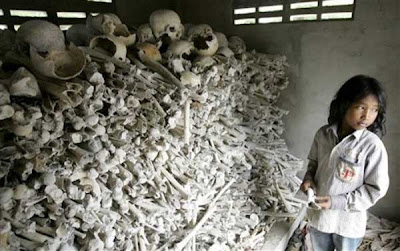Lent 5 - I Felt the Lord's Power
Fifth Sunday in Lent - March 9, 2008
Ezekiel 37:1-14; Psalm 130; Romans 8:6-11; John 11:1-45
Perhaps you’ve heard people refer to Lent as a “downer.” Probe a little, and I expect you will often find that this is a reaction against the notion of Lent as a fast or time of deprivation (so seldom observed), against a somber or even dreary quality in some of the music and worship, or against a focus on our sinfulness which may seem extreme.
Yet the story of Lent, as we journey with Jesus to Jerusalem and his Passion, is essentially forward-looking. There is a direction to the story. Even as we remember Jesus’ journey to Jerusalem and death, we are hearing the story from the other side.
These stories, though, reach out to where we are. We do not always live in the land of resurrection. These places of dry bones, these decaying bodies, these sealed tombs are real to us. Sometimes our sin brings destruction upon us. Sometimes the sin of others crashes into our lives. And the result is dry bones.
A young girl displays the bones of Cambodian genocide victims.
The prophet Ezekiel is taken to a valley full of bones. These could have been the bleached remains of a battle or massacre. In Darfur there are the bones of burned villages. In our own land we still find the burial grounds of slaves and Native Americans. But we don’t have to look across the world or back in time to see bones in a sea of troubles.
A modern Ezekiel might be taken to a small town on the prairie, where the local businesses are dried up and the next generation is exiled to another land.
Downtown Cairo, Illinois.
He or she might walk down the streets in certain neighborhoods, looking at foreclosure properties, houses without people. The prophet might be transported by bus to the furthest corners of our states, where prison fortresses keep some folks’ bones out of sight and far from home.
Faced with places and problems like these, we may be too daunted to believe that even God can make a difference. “LORD God, only you can tell [if these bones can live]” (Ezekiel 37:3) could be a faithful answer – it is certainly a cautious one.
But the church tells these stories because we have felt the Lord’s power. As a people we have seen with our own eyes and known in our lives that God is a God of deliverance.
God’s work does not stop when humans have done our worst. Ask relief workers, ask the descendants of slaves and other survivors of genocide, get a reality check from those in prison ministries. “Can these bones live?” If you can’t wait for Easter, ask Lazarus.
Shanghai earthquake, May, 2008
Available with additional content at the American Bible Society's Bible Resource Center.
Illustrations added March, 2011.
Ezekiel 37:1-14; Psalm 130; Romans 8:6-11; John 11:1-45
Perhaps you’ve heard people refer to Lent as a “downer.” Probe a little, and I expect you will often find that this is a reaction against the notion of Lent as a fast or time of deprivation (so seldom observed), against a somber or even dreary quality in some of the music and worship, or against a focus on our sinfulness which may seem extreme.
Yet the story of Lent, as we journey with Jesus to Jerusalem and his Passion, is essentially forward-looking. There is a direction to the story. Even as we remember Jesus’ journey to Jerusalem and death, we are hearing the story from the other side.
These stories, though, reach out to where we are. We do not always live in the land of resurrection. These places of dry bones, these decaying bodies, these sealed tombs are real to us. Sometimes our sin brings destruction upon us. Sometimes the sin of others crashes into our lives. And the result is dry bones.
The prophet Ezekiel is taken to a valley full of bones. These could have been the bleached remains of a battle or massacre. In Darfur there are the bones of burned villages. In our own land we still find the burial grounds of slaves and Native Americans. But we don’t have to look across the world or back in time to see bones in a sea of troubles.
A modern Ezekiel might be taken to a small town on the prairie, where the local businesses are dried up and the next generation is exiled to another land.
He or she might walk down the streets in certain neighborhoods, looking at foreclosure properties, houses without people. The prophet might be transported by bus to the furthest corners of our states, where prison fortresses keep some folks’ bones out of sight and far from home.
Faced with places and problems like these, we may be too daunted to believe that even God can make a difference. “LORD God, only you can tell [if these bones can live]” (Ezekiel 37:3) could be a faithful answer – it is certainly a cautious one.
But the church tells these stories because we have felt the Lord’s power. As a people we have seen with our own eyes and known in our lives that God is a God of deliverance.
God’s work does not stop when humans have done our worst. Ask relief workers, ask the descendants of slaves and other survivors of genocide, get a reality check from those in prison ministries. “Can these bones live?” If you can’t wait for Easter, ask Lazarus.
Available with additional content at the American Bible Society's Bible Resource Center.
Illustrations added March, 2011.






Comments